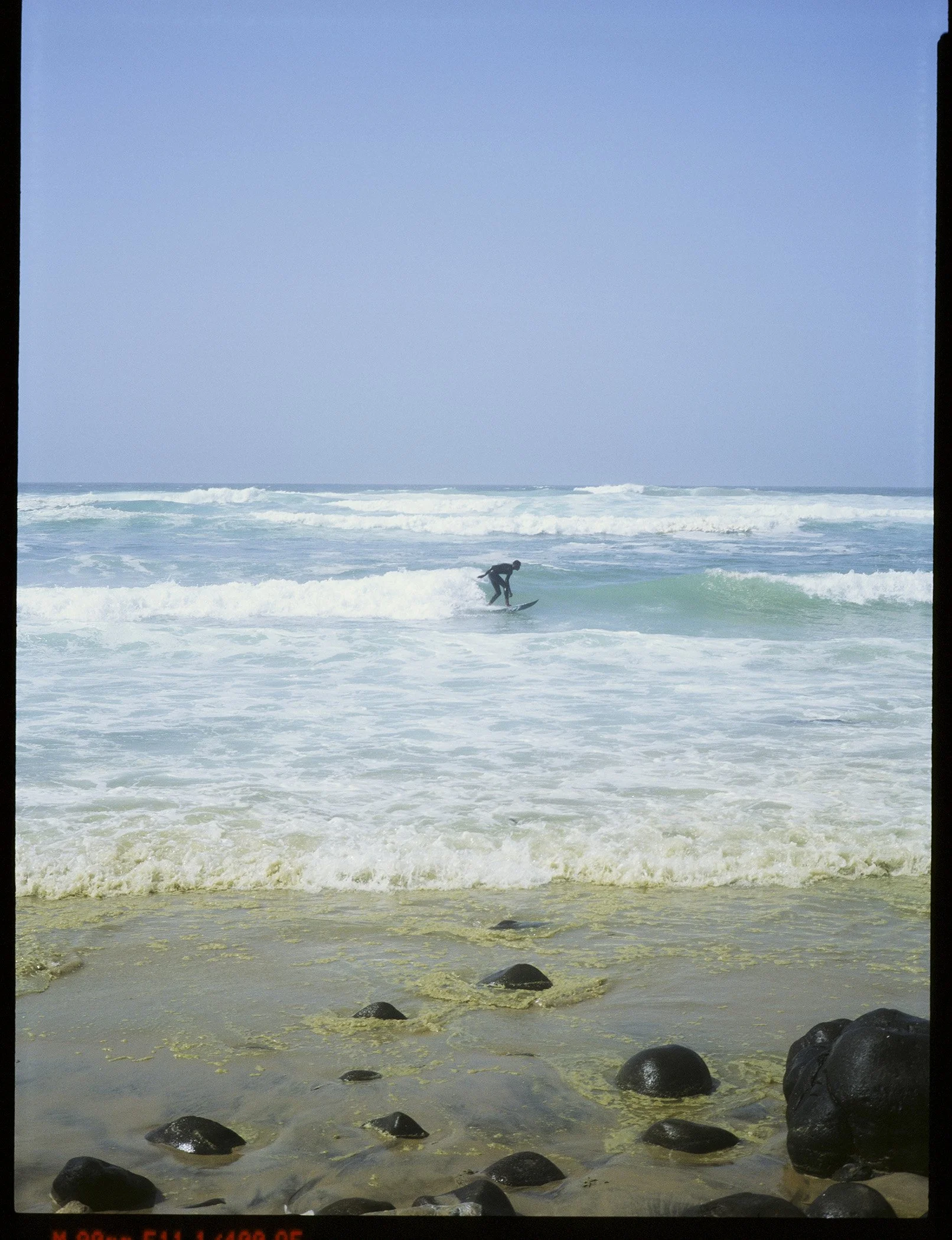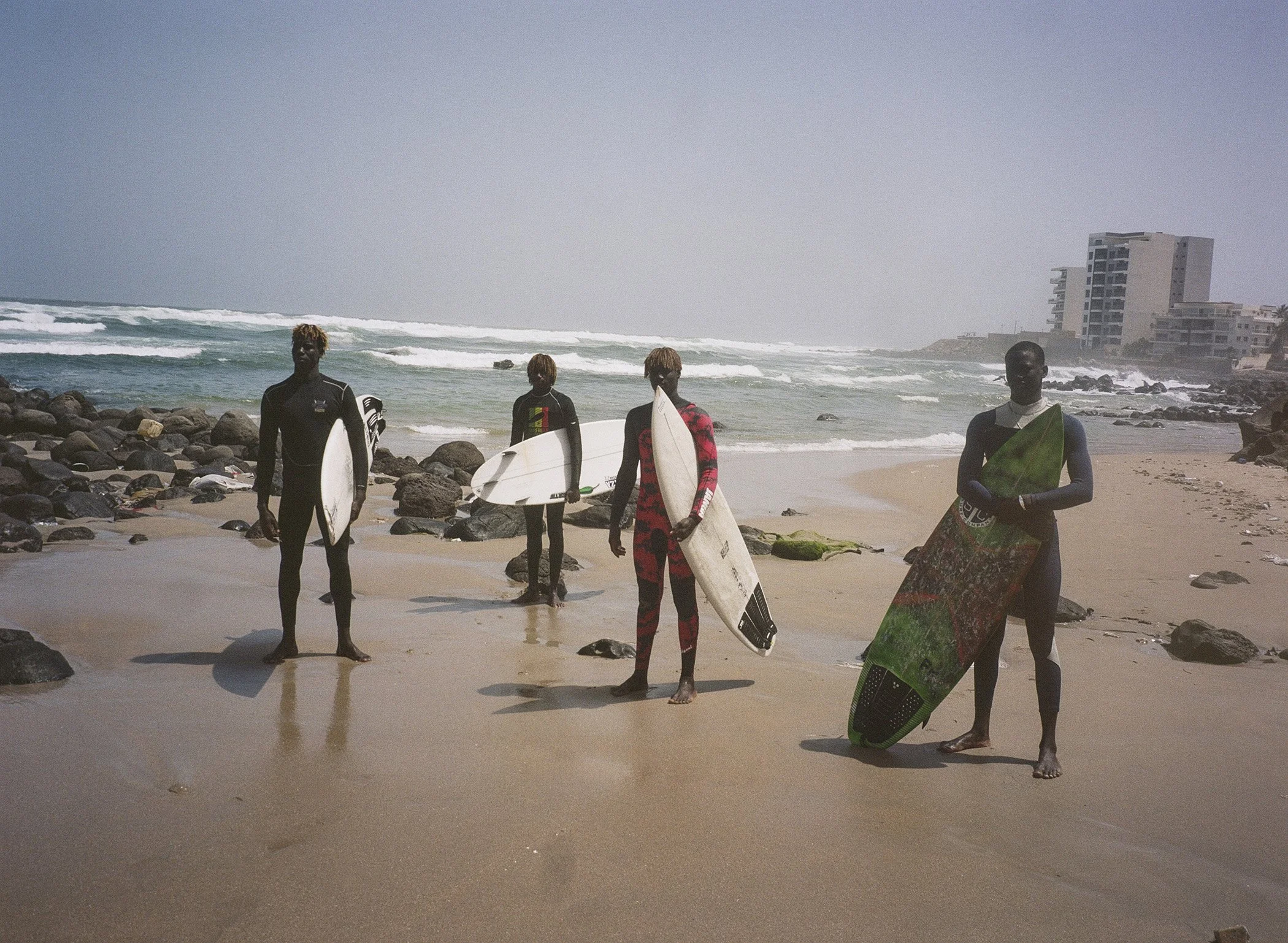Babacar Thiaw
Surfing as a Catalyst for Change
summer 2025
WORDS Emmett Levy
PHOTOGRAPHY Brandon Harrison
When educator, entrepreneur, and activist Babacar Thiaw surfs, he feels connected to the legacy of his ancestors, bygone stewards of the waves. The feeling is far too personal to share; when asked if he could recount this moment of revelation, he respectfully refused.
Babacar grew up in Yoff, a traditional fishing village in Dakar, Senegal. At six years old, he learned to surf at beaches laden with styrofoam, mangled bags, and bottles. Per capita, Senegal dumps five times more plastic into the ocean than the United States, around 783,000 tons per year. The pollution devastates Senegal’s marine ecosystems and burdens its fishing and tourism industries.
His activism was spurred in 2010, when surfing at a local beach, Babacar confronted a thick miasma—a mass of trash so dense he could barely ride a wave. He was compelled to act; “We have received the ocean from our ancestors, from our elders. So to be grateful for them, we have to keep it for the next generation.”
In 2018, Babacar decided to turn his family restaurant, the Copacabana Surf Village, into the first-ever zero-waste restaurant in Senegal. Copacabana has become a bastion of environmental activism, hosting educational programs, beachside cleanups, and meetings for grassroots organizing. It has since influenced nearly 100 restaurants in Senegal to follow suit and eliminate their use of single-use plastics.
The Copacabana catalyzes change through human connection, watering the seeds of a larger social movement and combating the solipsistic mindset at the core of the climate crisis. Babacar wants to convince people that “we’re in a war that doesn’t belong to a friendship, or a family, or the private sector. It belongs to everyone … Whether you are in San Francisco or Bacau, or Dakar, we’ve been impacted by global warming. The trash that we produce here goes through the currents and can end up on the coast of California. Or vice versa.” This global perspective doesn’t subsume the importance of his local work; it animates it.
Dakar is a small town compared to New York City or Los Angeles. Strolling through the beach, Babacar will always run into familiar faces, people who “look after you,” and maybe even compliment your outfit. He has become a mainstay of the community, feeding dozens of hungry children every week at the Copacabana and using the money he received from the 2024 Aloha Award to buy mattresses for schools, fund free surfing lessons, and install garbage bins at high-traffic beaches.
During our conversation, I asked Babacar if he ever considered running for office; being such a beloved figure, it would seem like a natural choice. However, he is skeptical of politics. “I think my heart will not allow me to do it. You know, because of the politicians, the way they act. If I tell you I’m going to do this, I will do it. No matter what it takes me, I will do it. Politics is so fake, and it’s untrue, you know? And I never say never, but for right now, my heart is not telling me to go there.” He prefers a grassroots approach to change-making, building lasting networks that will empower communities to hold politicians accountable.
Despite his aversion to politics, Babacar still takes on leadership as a surfing coach. While Dakar is home to some of the best surfing conditions in sub-Saharan Africa, with consistent waves that reach up to ten feet in the winter, the scene has struggled to break out onto the international stage. This is largely due to a lack of resources: “Everyone knows surfing is like an elite sport. And it’s very expensive. Before you get a board here, you have to really make money. Because everything is made overseas.” The young surfers have been stifled, unable to tour the world and represent their hometown at competitions. Babacar is currently searching for alternative funding, dedicated to uplifting this promising team, “so that these kids will rise, and they will look back and keep going.”
Since founding the Senegal chapter of the Surfrider Foundation, which is based in California, Babacar has been able to fund a profusion of environmental programs. Yet, as he collaborates with international organizations, travels the world, and promotes Dakar as a world-class surfing destination, he anticipates a level of risk. “There are a lot of tourists who come to Senegal because they love our waves and they love our culture,” Babacar doesn’t want to discourage visitors, but, “at the same time, people can also be responsible and aware of what’s going on. We are not saying we need someone to save us, but we need people who are responsible when they come, responsible tourism.”
After speaking with Babacar for an hour, I was moved by his ability to reach out across differences and bring people into his tent, an act he sees as a paragon of humanity; “If you are not able to look back, behind us, and grab a hand and walk with that hand and bring them up? Are we still human? Those are the values that I defend in my life.”
His tone is resolute as he exhorts, “Let’s not wait for our darkest moment to change things. Let’s change it right now. It is a matter of education. I know I’m different. You’re different. Can we use our differences to make a better world? That’s it.”
STORY CREDITS
PHOTOGRAPHY Brandon Harrison, FEATURING Babacar Thiaw, Mame Fallou Bousso, Karim Diouf, Mandione, Bassirou, MOTION EDITOR Nick Sgaglione, PRODUCER Brandon Harrison, LOCATION Copacabana Surf Village, Dakar, Senegal
Read more stories














